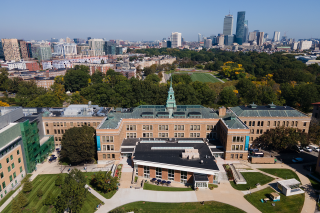Why did you decide to attend Simmons?

The idea of a woman-centered education was appealing to me, as I had attended an all-girl’s school in the Washington D.C. area since the fourth grade. I had family members who had attended schools in the Colleges of the Fenway, so the area was familiar to me, and I already loved Boston. I applied to larger universities as well, but ultimately decided I wanted a smaller school in an urban environment.
When I started college, I was already interested in studying English. From day one, I felt that my work was valued at Simmons. Classes with professors like David Gullette only built on my love of literature. When I took economics with Professor Carole Biewener, I was surprised by how she framed the material in the context of political economies. I fell in love with it — and ended up double majoring! Carole was also a wonderful mentor and advocate for me. I was very shy and didn’t know how to take advantage of networks and mentors, but Simmons has an environment where potential mentors draw you out. Carole saw my enthusiasm and cultivated it, creating opportunities for me.
How did your studies at Simmons lead you to law school?
While at Simmons I had an internship at a small elementary school in Cambridge. Many of the students were refugees from Haiti who had experienced a lot of trauma and violence. Their drawings often included guns and soldiers — these children had been severely impacted. At the same time, law students from Yale were going to Guantanamo Bay to assist the Haitian refugees held there. That got me thinking about law school, and how lawyers can serve the public interest. I chose Northeastern because it’s one of the most public-interest oriented law schools in the country, but the choice to attend was built from an experience I had while at Simmons.
How did you become interested in pro-bono work?
No matter where I’ve worked, whether for the government or for non-profits, I have always focused on creating partnerships for collaboration. I’ve always been interested in big social issues, especially those impacting lower-income communities of color. To support this work, I knew I needed involvement from the private sector. There are incredibly smart and talented people in the legal field who donate significant time and effort to influence social issues with their pro bono work. Because lawyers have a “monopoly” of sorts over our justice system (the legal system is very difficult to navigate without a law degree or legal training), it’s part of our ethical standards to provide legal assistance to people who can’t otherwise afford legal representation. I wanted to commit my career to economic equity, racial and social justice.I can do that by encouraging collaboration and partnerships across the legal sector, as there are a lot of people there who can make a difference and do a lot of good.
Tell me about your current role.
In my current role, the Pro Bono Innovation Fund puts out millions of dollars annually to engage pro bono attorneys to serve low income people who can’t afford attorneys for civil legal problems. In criminal law, individuals charged with a crime who cannot afford a lawyer have the right to have an attorney appointed for them.Unfortunately, there is no right to an attorney for civil legal problems. Many civil legal problems are life-altering for the people who need representation, like the family being evicted from their home, the mother fighting for custody of her children, or a domestic violence survivor seeking a protective order from an abusive partner. It’s important that we provide meaningful access to our legal system and address these issues in the most comprehensive way possible.
What do you find most rewarding about this work?
It’s been a privilege to work with civil legal aid organizations. The advocates at these nonprofits are the essential workers of our legal system, showing up and tirelessly fighting every day for the families, parents, children, and survivors. Because of the pandemic, The number of cases and legal needs have become more acute. I work with leaders in community nonprofits addressing these issues directly, and it’s humbling. My approach has always been to ask front line advocates what they are seeing, and work to structure funding that is responsive to the most critical needs in their communities. People working in those front line positions have high rates of burnout. Working across communities to make connections and help improve workflow is very rewarding. If I can help make their work easier I’m happy to do it, and I always stay tuned into what they are doing and what their needs are.
How did Simmons prepare you to become a leader in your field?
When I was at Simmons in the 1990’s, the interdisciplinary approach was already baked into how Simmons educates women. Simmons taught me how to take a holistic approach to every issue. Now, engaging with social justice issues, I know that lawyers are not the only solution to the problem; we need social scientists, behavioral scientists, politicians, social workers, and funders to address these issues. Simmons taught me how to stay open to different viewpoints, which is something I’ve carried with me for my whole career. Now my daughter is attending Simmons, taking a leadership course taught by a Political Science professor.
Any advice for current students?
Simmons professors will find you and draw out your talent, but don’t hesitate to take advantage of the offers of assistance. It’s often not a linear path to find what your passion is, or how you can make a positive contribution. Looking back, I can see the thrulines that started back at Simmons, and those threads are still a part of my work to this day.

